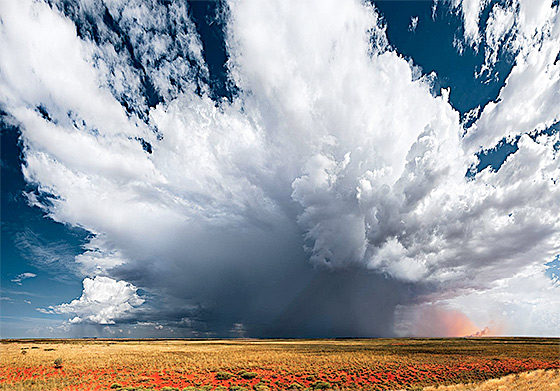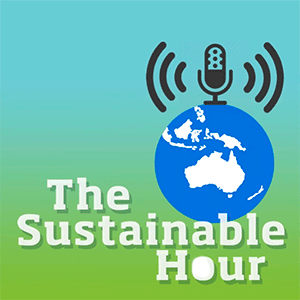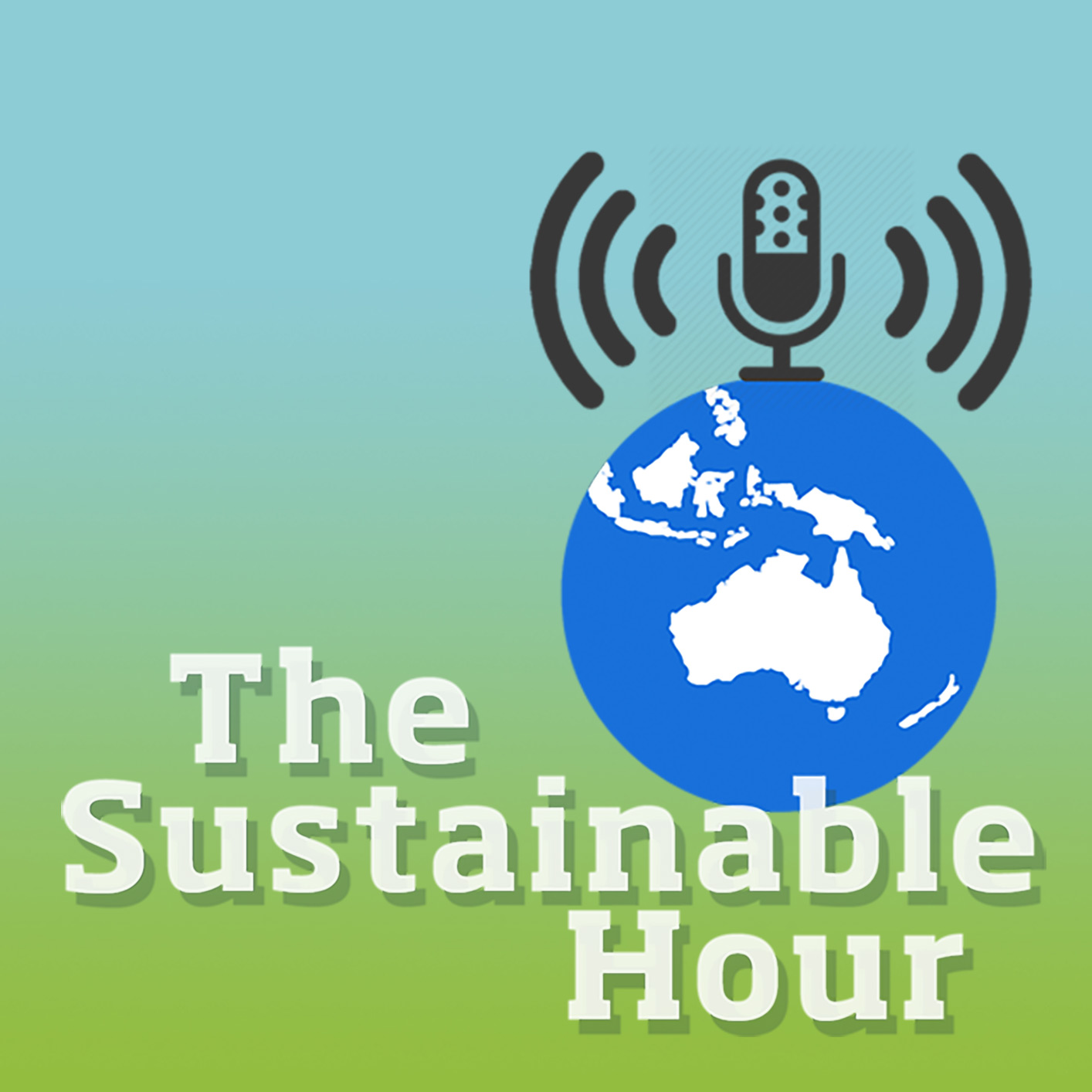
Podcast: Download (Duration: 1:00:00 — 27.6MB)
Subscribe: Apple Podcasts | Spotify | Android | RSS | More
The Sustainable Hour no 401
While we appear to be coming out of the Covid-tunnel, the events around us have rarely been more turbulent, which makes it important for all of us to keep as calm, bold and focused as possible.
Our first guest on 2 March 2022 is Geelong GP doctor Jenny Huang. As well as working as a medical doctor, Jenny volunteers with Healthy Futures – a group of climate-concerned health professionals who recently ran a ‘die in’ outside AGL’s offices in Melbourne to shine a light on the health impacts of the fracking operations they carry out in the Northern Territory.
Following Jenny, we have two very courageous Ugandan Extinction Rebellion climate activists, Elijah and Josh. We learn what motivates them to continue standing up for a safer, more just, inclusive and healthy climate in spite of the consequence of very harsh punishments hanging over them. Earlier this year, one of their colleagues was killed by the police because of his protesting. Prior to the interview, when asked about why they continue to protest with that sort of reaction hanging over them, their response was: speaking out publicly about this oppressive treatment makes us feel safer against the hostilities.
Elijah and Josh are involved in a 400 kilometres ‘climate caravan’ from one side of their country to the other. Their aim here is to educate people by telling the truth and mobilise them to become active participants in local and wider afield solutions. They have set up a crowdfunder to help fund this initiative: Great Lakes Climate Caravan.
Mik Aidt starts us off today with a significant quote from Bob Hawke from some 40 years ago. In it, our former Prime Minister urges us to get with the science and do what is necessary:
“We are at a unique point in human history. Due to the scientific genius of men and women, we can either on the one hand improve the standard and quality of life of all mankind or we can destroy the planet as we know it.”
~ Bob Hawke, former Prime Minister of Australia
This leads to comments about the unprecedented floods in South East Queensland and North East New South Wales. Along with this Mik refers to two recent and reputable international reports: the latest 3,600-plus-page report from the Intergovernmental Panel on Climate Change titled ‘Climate Change 2022: Impacts, Adaptation and Vulnerability‘, and the Red Cross’ ‘Come Hell or High Water‘ report that re-emphasises the terms ‘climate emergency’. We play a four-minute excerpt of UN Chief Antonio Guterres‘ extraordinary but in mainstream media completely unreported speech at the IPCC report launch event. “Every voice can make a difference,” he stated. We’ve enclosed his speech in full further down on this page – here are a few excerpts:
“I have seen many scientific reports in my time, but nothing like this. Today’s IPCC report is an atlas of human suffering and a damning indictment of failed climate leadership. This abdication of leadership is criminal. The world’s biggest polluters are guilty of arson of our only home.
Coal and other fossil fuels are choking humanity. All G20 governments must now urgently dismantle their coal fleets. Those in the private sector still financing coal must be held to account. Oil and gas giants – and their underwriters – are also on notice. Fossil fuels are a dead end – for our planet, for humanity, and yes, for economies. Delay means death.
I know people everywhere are anxious and angry. I am, too. Now is the time to turn rage into action. Every fraction of a degree matters. Every voice can make a difference. And every second counts.”
~ Antonio Guterres, United Nations General-Secretary – excerpts from his speech at the launch of the IPCC report ‘Climate Change 2022’
Mik reflects on where this places those people in Viva Energy and the Victorian Government who currently are engaged with the preparations for constructing a new major fossil fuel project in Geelong. Viva Energy have recently released their Environmental Effects Statement for their proposed gas import terminal. Geelong Renewables Not Gas and Environment Victoria are seeking experts with technical knowledge to contribute to submissions to the Viva statement, which are closing on 11 April 2022, while they also seek community members who will add their signature to the Geelong Renewables Not Gas petition against the proposed fossil fuel import terminal.
Later during the hour, Mik refers to Damon Gameau‘s latest film, ‘Regenerating Australia‘. You can listen to Damon explaining more about his new film and his 2030-vision in a one-hour episode of the RegenNarration podcast.
We play an advertisement from Voices of Corangamite – and Mik also presents us to Tchando, a Denmark-based musician and singer from Guinea-Bissau, who recently launched a new music video for his song ‘Ba’.
Colin Mockett‘s Global Outlook this week begins in Denmark, where the wind turbine manufacturing company Vestas has been voted the most sustainable company in the world. This coincides with the company announcing that it is not only carbon neutral now, but it plans to be zero-waste by 2040. The judges assessed more than 6,000 companies worldwide and found Danish companies 1 and 2 at the top. Second was Hansen Holdings, third was Autodesk Inc from USA. Fourth was Schneider Electrics of France. Australia had two businesses in Top 30: Bramley and Simms.
We zoom to the United States, where a new report predicts that sea levels along United States coastlines are projected to rise between 10 and 12 inches on average by 2050 – that’s 25 to 30 centimetres.
The forecasted increase over the next 30 years would amount to the same rise seen over the last 100 years. The report, titled the ‘Global and Regional Sea Level Rise’ Report, involved scientists from government agencies including the Environmental Protection Agency and the United States Geological Survey, collecting satellite data and modelling projections. Their report predicts more frequent, major and destructive high tide flooding events along with taller storm surges by 2050. The Gulf Coast will likely see the biggest change, with sea levels expected to rise between 14 and 18 inches. The East Coast will also see levels 10 to 14 inches. On the other side of the country, the West Coast has lower predicted rise: between 4 and 8 inches.
Then to the United Kingdom where the government announced £67 million ($AUS122 million) to upgrade insulation in homes and install low-cost clean heating. This scheme will improve up to 4,300 low-income households. Grants will pay for energy efficiency measures such as wall and roof insulation, as well as new low-carbon heating systems, thermostats and room heating controls.
In the Himalayas the ice melt on Mount Everest’s highest glacier is occurring at an alarming pace, according to a study published last week by a University of Maine-led research team. The team’s findings suggested that ice that had taken decades to accumulate was melting away each year, jeopardising not just climbers but also those communities that depend on the glacier for drinking water and irrigation. The new report is the most comprehensive scientific investigation ever attempted in the area. As part of that expedition, the scientists obtained the highest-ever ice core and established the world’s two highest automatic weather stations.
Back to Europe where data released shows the past seven years have been the hottest ever recorded globally, by a clear margin. Scientists with the European Union’s Copernicus Climate Change Service released their latest figures showing that 2021 was the fifth place behind 2016 and 2020 which were “effectively tied” for the warmest year on record, followed by 2015 then 2018. The report warned that despite all the efforts and methods used by governments worldwide, global greenhouse gas emissions were continuing to rise. Carbon dioxide levels reached a global record last year, fuelled in part by megatons of carbon that were released by the US west-coast wildfires.
In Kenya climate change-induced drought has brought on worsening food insecurity. Beans, maize and sweet potato yields have dwindled over the years because of low rainfall, but the years 2020 and 2021 have been the worst. A succession of droughts has seen crops dry and shrivel while livestock waste away. Besides low rainfall, the situation has been worsened by desert locust infestations.
Finally to the UK where our now-traditional end-story about the world’s greenest football team, Forest Green Rovers, was mixed. The bad news is that Rovers lost 2 – 1 away to Crawley. Following last week’s loss to Walsall, this is the first time the Rovers have lost two in a row this season. But the good news is that the teams in second and third position lost as well, so Forest Green Rovers remain ten points clear at the top of the ladder with a game in hand.
That’s it for another week. We live in a fast-moving and often confusing world with news about human-induced catastrophes, but – right ‘under the surface’ of mainstream news – there are so many amazing and hard-working people finding more and more ways to join the climate revolution and be the difference they want to see in the world. In The Sustainable Hour, we hope that this inspires you to get involved too, if you aren’t already. In Guterres’ words, “Every voice can make a difference.”
Mik, Colin and I plan to turn our voices down, though, and take a back seat in next week’s program as 8 March 2022 is International Women’s Day. You will be listening to two hosts and two international guests telling their powerful stories to honour that day. We hope you’ll join them.
~ Tony Gleeson
“Every second counts. Every voice can make a difference.”
Antonio Guterres, United Nations General-Secretary, about the climate emergency and the need for change
→ Subscribe to The Sustainable Hour podcast via iTunes or Stitcher
- Bloomberg Green compiled “30 startling numbers” from the report on extreme weather, biodiversity, oceans, and food that could serve as a springboard for countless follow-up stories.
- The Huffington Post shared 14 takeaways that can spark inspiration for journalists, including the report’s finding that climate change threatens people’s mental health.
. . . . . . . . . . . . . . . . . . . . . . . .

. . . . . . . . . . . . . . . . . . . . . . . .
Acknowledgement
We at The Sustainable Hour would like to pay our respect to the traditional custodians of the land on which we are broadcasting, the Wathaurong People, and pay our respect to their elders, past, present and future.
The traditional owners lived in harmony with the land. They nurtured it and thrived in often harsh conditions for millenia before they were invaded. Their land was then stolen from them – it wasn’t ceeded. It is becoming more and more obvious that, if we are to survive the climate emergency we are facing, we have much to learn from their land management practices.
Our battle for climate justice won’t be won until our First Nations brothers and sisters have their true justice. When we talk about the future, it means extending our respect to those children not yet born, the generations of the future – remembering the old saying that…
“We do not inherit the Earth from our ancestors. We borrow it from our children.”
The decisions currently being made around Australia to ignore the climate emergency are being made by those who won’t be around by the time the worst effects hit home. How disrespectful and unfair is that?

. . . . . . . . . . . . . . . . . . . . . . . .
. . . . . . . . . . . . . . . . . . . . . . . .
“Renewable energy is freedom energy.”
~ Christian Lindner, Germany’s finance minister
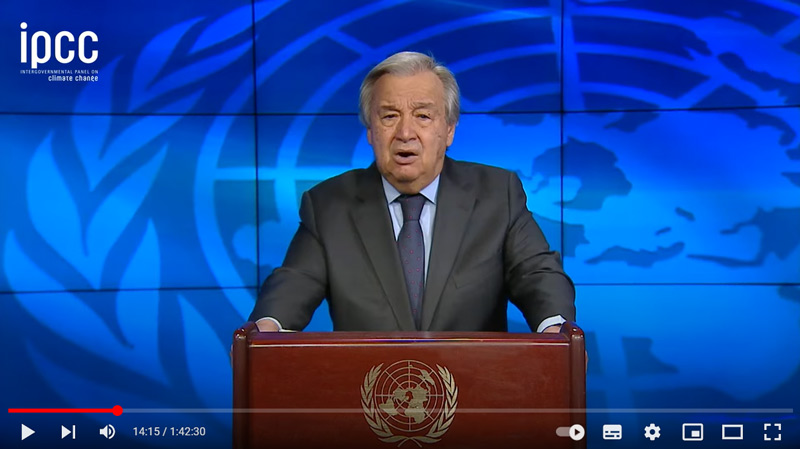
UN chief: “This abdication of leadership is criminal”
Many ecosystems are at the point of no return – now.
Unchecked carbon pollution is forcing the world’s most vulnerable on a frog march to destruction – now.
The facts are undeniable.
This abdication of leadership is criminal.
The world’s biggest polluters are guilty of arson of our only home.
It is essential to meet the goal of limiting global temperature rise to 1.5 degrees.
Science tells us that will require the world to cut emissions by 45 percent by 2030 and achieve net zero emissions by 2050.
But according to current commitments, global emissions are set to increase almost 14 per cent over the current decade.
That spells catastrophe.
It will destroy any chance of keeping 1.5C alive.
Today’s report underscores two core truths.
“The new IPCC report assesses the impacts of climate change and how humanity and ecosystems are both vulnerable and adapting to it.
I have seen many scientific reports in my time, but nothing like this.
Today’s IPCC report is an atlas of human suffering and a damning indictment of failed climate leadership.
With fact upon fact, this report reveals how people and the planet are getting clobbered by climate change.
Nearly half of humanity is living in the danger zone – now.
First, coal and other fossil fuels are choking humanity.
All G20 governments have agreed to stop funding coal abroad. They must now urgently do the same at home and dismantle their coal fleets.
Those in the private sector still financing coal must be held to account.
Oil and gas giants – and their underwriters – are also on notice.
You cannot claim to be green while your plans and projects undermine the 2050 net-zero target and ignore the major emissions cuts that must occur this decade.
People see through this smokescreen.
OECD countries must phase out coal by 2030, and all others by 2040.
The present global energy mix is broken.
As current events make all too clear, our continued reliance on fossil fuels makes the global economy and energy security vulnerable to geopolitical shocks and crises.
Instead of slowing down the decarbonization of the global economy, now is the time to accelerate the energy transition to a renewable energy future.
Fossil fuels are a dead end – for our planet, for humanity, and yes, for economies.
A prompt, well-managed transition to renewables is the only pathway to energy security, universal access and the green jobs our world needs.
I am calling for developed countries, Multilateral Development Banks, private financiers and others to form coalitions to help major emerging economies end the use of coal.
These targeted mechanisms of support would be over and above existing sustainable development needs.
The second core finding from this report is slightly better news: investments in adaptation work.
Adaptation saves lives.
As climate impacts worsen – and they will – scaling up investments will be essential for survival.
Adaptation and mitigation must be pursued with equal force and urgency.
That’s why I have been pushing to get to 50% of all climate finance for adaptation.
The Glasgow commitment on adaptation funding is clearly not enough to meet the challenges faced by nations on the frontlines of the climate crisis.
I’m also pressing to remove the obstacles that prevent small island states and least developed countries from getting the finance they desperately need to save lives and livelihoods.
We need new eligibility systems to deal with this new reality.
Delay means death.
I take inspiration from all those on the frontlines of the climate battle fighting back with solutions.
All development banks – multilateral, regional, national – know what needs to be done: work with governments to design pipelines of bankable adaptation projects and help them find the funding, public and private.
And every country must honour the Glasgow pledge to strengthen national climate plans every year until they are aligned with 1.5C.
The G20 must lead the way, or humanity will pay an even more tragic price.
I know people everywhere are anxious and angry.
I am, too.
Now is the time to turn rage into action.
Every fraction of a degree matters.
Every voice can make a difference.
And every second counts.
Thank you.”
~ Antonio Guterres, United Nations General-Secretary, speaking at the launch of IPCC’s report ‘Climate Change 2022’
Irreversible climate impacts
“The latest Intergovernmental Panel on Climate Change report makes for grim reading with scientists confident the world will surpass 1.5 degrees of heating before 2040, leading to irreversible climate impacts including the loss and degradation of much of the world’s coral reefs, including the Great Barrier Reef.
And the devastation will not be limited to Australia with Indonesia planning to move its sinking, flood-prone capital to a remote jungle while Tuvalu is trying to safeguard its very existence as rising seas caused by climate change threaten to submerge the Pacific island nation.
The warnings come as residents across southeast Queensland and northern NSW are hammered by devastating floods that have caused eight deaths and an estimated 15,000 homes to be flooded.”
~ Greenpeace
→ The Guardian – 28 February 2022:
Climate scientists warn global heating means Australia facing more catastrophic storms and floods
“Intergovernmental Panel on Climate Change says climate effects expected to be more severe than initially predicted.”
. . . . . . . . . . . . . . . . . . . . . . . .
“This is not about just telling people change their light bulbs or to buy a hybrid car. This disaster has grown beyond the choices that individuals make. This is now about our industries, and governments around the world taking decisive large-scale action.”
~ Leonardo DiCaprio, American actor and film maker
group of Australians who were asked about their hopes and dreams for the future.”
. . . . . . . . . . . . . . . . . . . . . . . .
. . . . . . . . . . . . . . . . . . . . . . . .
. . . . . . . . . . . . . . . . . . . . . . . .
IPCC finds window for successful climate risk reduction & adaptation is closing
1 MARCH 2022 – PRESS RELEASE from Citizens’ Climate International
The Intergovernmental Panel on Climate Change has published the contribution of Working Group II to the 6th Assessment Report. Working Group II reports on what science tells us about Impacts, Adaptation, and Vulnerability. The findings serve as another red alert regarding the fate of humankind in the face of steadily worsening climate impacts.

Examining Impacts, Adaptation, and Vulnerability, the IPCC has identified urgent need across human experience to reduce risk and enhance adaptive capacity.
Among the key takeaways:
- We have entered the era of human-induced losses and damages due to climate change, with losses observed in ecosystems across all regions of the world.
- Climate disruption threatens human health, as well as economic security and the stability of communities, institutions, and nations.
- Health impacts—including trauma from extreme events, food and water scarcity, and spillover pathogens—are happening in every region.
- Approximately 3.3 to 3.6 billion people live in contexts that are highly vulnerable to climate change, with forced displacement a growing risk.
- Inaction is not only irresponsible but also dangerous: adapting to climate impacts will become increasingly impossible without faster emission cuts.
- Delaying action to mitigate climate change leads to compounding risks, and eventually to irreversible damage.
- Relying on techno-fixes alone to solve the crisis risks overshooting warming beyond 1.5°C, with dangerous costs for people and biodiversity.
- Misinformation and active resistance to climate action from the oil and gas industry have made us more vulnerable.
- Participatory civic processes and engagement with stakeholders are needed to ensure adaptation measures are effective and do not lead to maladaptation.
The major takeaway is that the narrow remaining window of opportunity is rapidly closing for successful mitigation of and adaptation to global climate destabilization. Adapting when emergency arrives will already be too late. Underlying this urgent warning is the observed evidence that nonlinear compounding risks and impacts proliferate as global heating advances.
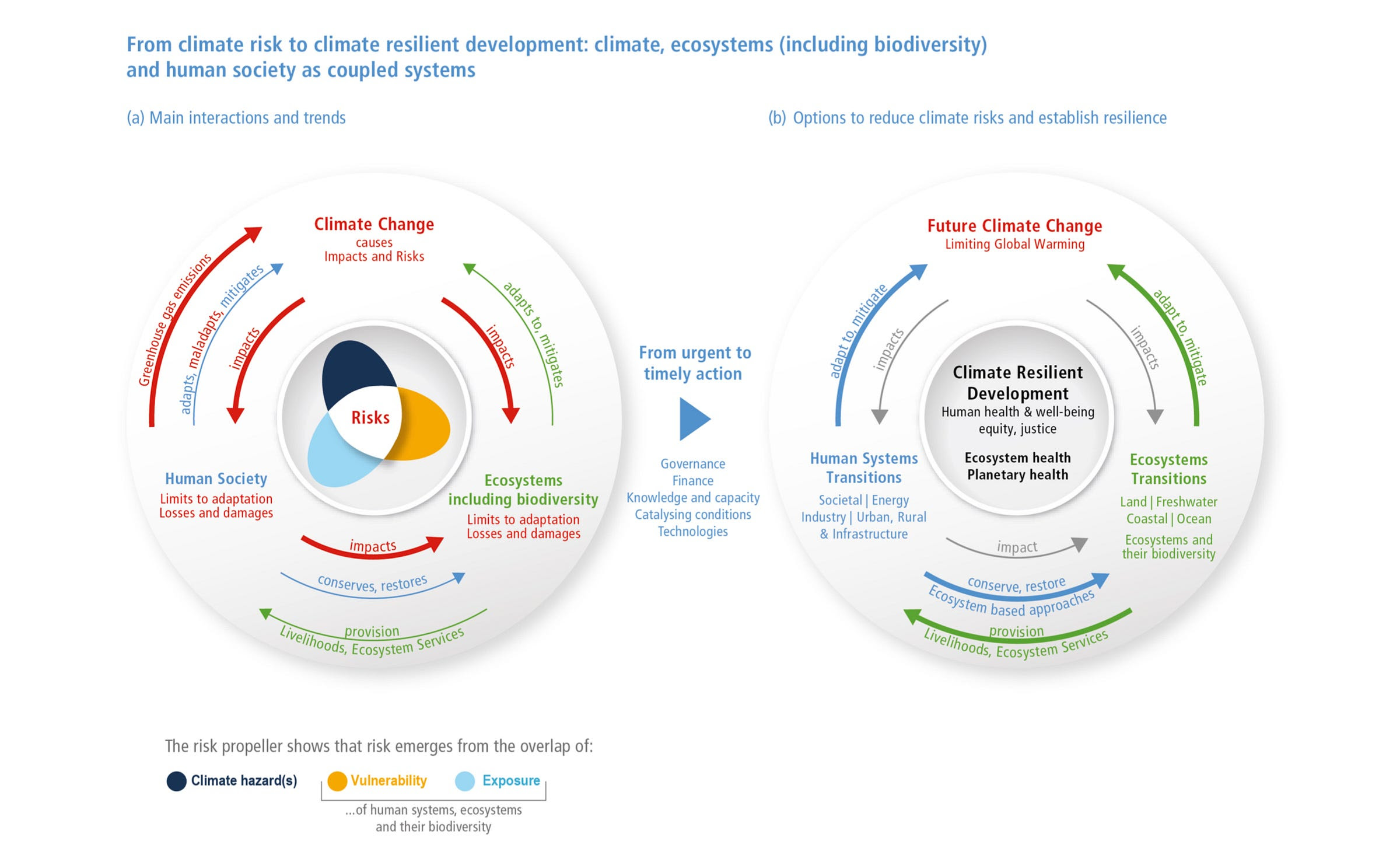
The Working Group II report examines multisystem interactions between human systems, the climate system, and nature, which result in nonlinear compounding risk and impact, which increases vulnerability. Image credit: IPCC.
Nonlinear compounding risks and impacts mean even where we succeed with incremental steps, failing to reach the required level of early action and high ambition will mean facing unmanageable emergencies. Some regions are already experiencing both soft and hard barriers to adaptation.
Now is the time for urgent action to reduce risk, build resilience & protect people.
The report cites evidence of already widespread and worsening direct health impacts on people and populations
SPM.B.1.4 Climate change has adversely affected physical health of people globally (very high confidence) and mental health of people in the assessed regions (very high confidence). Climate change impacts on health are mediated through natural and human systems, including economic and social conditions and disruptions (high confidence). In all regions extreme heat events have resulted in human mortality and morbidity (very high confidence). The occurrence of climate-related food-borne and water-borne diseases has increased (very high confidence). The incidence of vector-borne diseases has increased from range expansion and/or increased reproduction of disease vectors (high confidence). Animal and human diseases, including zoonoses, are emerging in new areas (high confidence).
As an organization devoted to the right of people to actively contribute to sustainable economies that help to secure a livable climate future, we celebrate the recognition that citizen engagement is critical. Effective adaptation planning means considering long-term risks and impacts, to properly gauge the cost effectiveness and high priority of acting early to mitigate, adapt, and build resilience.
The Working Group II report was produced by 270 authors from 67 countries, including 47 coordinating authors, 184 lead authors, and 39 review editors. 43% of the authors were from developing countries and 41% were women. The report also draws on the work of 675 contributing authors and over 34,000 cited references. Before reaching the final product, Working Group II received a total of 62,418 expert and government review comments.
In 2022, CCI will be working to integrate a long-term global adaptation standard of zero preventable harm into our work, including:
- Civic engagement around locally led adaptation and contributions to global mitigation;
- Resilience intelligence reporting on Reinventing Prosperity and climate-smart finance;
- Raising awareness about the value-building interactions between mitigation, adaptation, and resilience efforts;
- A global online consultation on a Zero Preventable Harm Global Goal on Adaptation.
[ENDS]
. . . . . . . . . . . . . . . . . . . . . . . .
 Chuck Them Out WeekNewsletter from Smart Voting Team – 1 March 2022:Over 1 million social media views Thanks to your bin sticker posts, we’ve had over 1 million social media views for the campaign on our channels alone (and many more across external channels). Australians really want to see this government in the bin… no surprise there! View bin sticker social feed Get ready for Chuck Them Out Week! Let’s not stop now, momentum is building fast and the media are watching. To push the campaign to the next level, we’re launching Chuck Them Out Week. Let’s make some noise  Take a photo with your bin Take a photo with your bin During this week, let’s create as much noise as we can on social media. What to do? Post photos of your bins loud and proud on the street, on whichever social media channels you frequent. For even more impact, get in the photo yourself! Make sure you use hashtags: #ChuckThemOut, #BinHim and #EnoughIsEnough, and tag @smartvoting2022  Get the family involved Finally, we heard a batch of bin stickers weren’t up to scratch and peeled off too easily – if this was you, please let us know so we can send out a replacement. Simply mention the email address you ordered with. In the meantime, sticky tape works a treat. Here’s to chucking this government out in May 2022! All the best, Smart Voting Team ABOUT Smart Voting was established to ensure we chuck out the Federal Coalition in the 2022 federal election. All profits will be funnelled back into the campaign. Follow Smart Voting on Social Media FOLLOW ON INSTA – FOLLOW ON TWITTER – FOLLOW ON FACEBOOK #EnoughIsEnough #ChuckThemOut #BinHim |
. . . . . . . . . . . . . . . . . . . . . . . .
. . . . . . . . . . . . . . . . . . . . . . . .
Events we have talked about in The Sustainable Hour
Events in Victoria
The following is a collation of Victorian climate change events, activities, seminars, exhibitions, meetings and protests. Most are free, many ask for RSVP (which lets the organising group know how many to expect), some ask for donations to cover expenses, and a few require registration and fees. This calendar is provided as a free service by volunteers of the Victorian Climate Action Network. Information is as accurate as possible, but changes may occur.
Petitions
→ List of running petitions where we encourage you to add your name
. . . . . . . . . . . . . . . . . . . . . . . .
Live-streaming
The Sustainable Hour is streamed live on the Internet and broadcasted on FM airwaves in the Geelong region every Wednesday from 11am to 12pm (Melbourne time).
» To listen to the program on your computer or phone, click here – or go to www.947thepulse.com where you then click on ‘Listen Live’ on the right.
. . . . . . . . . . . . . . . . . . . . . . . .
Podcast archive
Over 400 hours of sustainable podcasts.
Listen to all of The Sustainable Hour radio shows as well as special Regenerative Hours and Climate Revolution episodes in full length:
→ Archive on climatesafety.info – with additional links
→ Archive on itunes.apple.com – phone friendly archive
Receive our podcast newsletter in your mailbox
We send a newsletter out approximately six times a year.
Email address and surname is mandatory – all other fields are optional.
You can unsubscribe at any time.
Find The Sustainable Hour on social media
Facebook:
www.facebook.com/TheSustainableHour
→ Overview of all podcast front covers
Twitter:
www.twitter.com/SustainableHour
Instagram:
www.instagram.com/TheSustainableHour
YouTube:
www.youtube.com/c/thesustainablehour
Share the news about this podcast in social media
→ Share on www.twitter.com
→ Podcasts and posts on this website about the climate emergency
→ Podcasts and posts on this website about the climate revolution
→ Find the latest news on BBC about climate change


